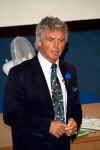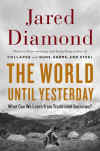|
Nutritional Anthropology |
|
|
The World Until Yesterday Jared Diamond Penguin (2012) ISBN-13: 978-1-846-1458-6 |
|
Book Review Index |
This
review on Amazon: http://amzn.to/17a8P1e Diamond, who is in his mid seventies, points out that one of the skills that improves with age is the art of synthesis. He has done just that with his latest book which sets out to apply the lessons of hunter-gatherer life to today’s world. He leans heavily on his experience with the tribes of New Guinea but synthesizes it with a wide range of other sources – for example Daniel Everett’s Pirahã of the Amazon [Don’t Sleep there are Snakes], Richard Lee’s San Bushmen [Kalahari Hunter Gatherers], Frank Marlowe’s Hadza [The Hadza] and many others. This is important, since the New Guinea tribes in many ways are not representative of our formative Pleistocene past. They don’t live as foragers in a sparsely inhabited savanna but as gardeners/swine-herds in a crowded, wet, jungle environment. Having said that, Diamond tackles diverse subjects such as Warfare; The Workplace; Justice, disputes and vendettas; Religion; Health; Multilingualism; Old people; Risk and many more. Many of these are difficult topics for a UCLA professor to deal with honestly. He has to avoid politically-correct academia from metaphorically burning him at the stake. He has to avoid thought crime! So Diamond’s prose is reminiscent of Darwin’s in Origin of Species where, almost apologetically, he says that the evidence seems to say such-and-such, but please prove me wrong! In this regard, Steven Pinker, in his book: [The Blank Slate: The modern denial of human nature] is much more outspoken about lessons to be drawn from the evolutionary origins of human behavior.
Warfare On the other hand (unlike scorched earth policies), gardens, women, and other resources are preserved as part of the spoils. When anthropologist Napoleon Chagnon told a Yanomamo warrior about World War II, he said, “You probably raided the Germans because of woman-theft, didn’t you.” In Richard Wrangham’s reference work on the subject of warfare, [Demonic Males], Wrangham wryly observes that, ultimately, all warfare is about access to fertile women – that is, getting genes into the next generation. In confirmation, Diamond cites Chagnon: "Yanomamo killers have, on average, 2.5 times more wives and over 3 times more children".
Bringing up Children From his experiences with primal tribes in New Guinea, Jared Diamond believes we can learn much about child rearing practices when humans are in a state of nature. In this he comes to similar conclusions that I do in [Deadly Harvest]. These can be summarized briefly as: a woman gives birth alone, or with the assistance of other women – men are not involved; infanticide is practised in cases of necessity; babies are breast-fed for three years or more; pre-chewed pap is introduced at 6 months; nursing is on demand; babies sleep cuddled up to their mother or close relative. During the day, small babies are carried in a sling on their mother’s breast; older babies on their mother’s backs; and toddlers usually on the shoulders. In all cases the child faces the same way as the mother. Fathers play little role in child-rearing, but are vital for provisioning and protecting the family; children play in multi-age playgroups, not in same-age cohorts; and all members of the band are involved in caring for all the other children in the band a practice known as ‘alloparenting.Crying children are immediately comforted; children are rarely punished – either physically or psychologically; children have great autonomy and are permitted to do dangerous things. There are no state government interests (e.g. compulsory schooling with its social agenda) to conflict with parents’ upbringing interests. Diamond concludes with an observation echoing Dan Everett’s concerning the Pirahã: “[We] are struck by the emotional security, self-confidence, curiosity and autonomy of the children and adults of small-scale societies.”
Risk Prioritizing When assessing risks in the modern world, too frequently people get it wrong. Personally, I see it all the time. For example, many people believe sea-salt is ‘natural’ and thus healthy, when it is, just like regular table salt, harmful sodium chloride. But, in forager life, correct assessment of risk is a matter of life and death. Moreover, every day, a forager has to take big risks. Diamond makes the case for foragers being very good at assessing and prioritizing the risks they face in their world. For example, San hunters driving lions off their kill. It’s eat or be eaten! But the San carefully assess the time when the lions are sufficiently sated to not put up a fight yet not so sated that there is no food left. Diamond also introduces an interesting notion: ‘constructive paranoia’. This is when it makes sense to be ultra cautious about a possible danger since getting it wrong will mean death. He cites the example of a broken twig found in the hunter’s trail. Is it just chance? Or is it made by hostile strangers? The tribesmen take extraordinary precautions ‘just in case’. Today, suggests Diamond, our hard-wired constructive paranoia is triggered in dysfunctional ways. For example over myths such as nuclear power being more dangerous than car driving (it isn’t) or that pesticides kill more people than surgery (they don’t).
Old Age: Those foragers who ran life’s full gauntlet and made it to an advanced age could still walk the 10 miles from one camp to the next. When they couldn’t they were left for dead [Deadly Harvest].But Diamond explores more advanced tribes where Darwinian logic finds its expression in doing away with old people. That is, old people are history and it is in the kids’ interests for them to disappear. Some unacculturated tribes still maintain their gruesome traditions where, for example, the old-timers see it as their duty to submit to – and even welcome - garroting or being buried alive. Others, unsuspecting, are clubbed to death from behind. Many, like the Fijians, would (but don’t now) cook and eat them. For once Diamond, as a 75-year-old, takes comfort that Western ways are superior to such practices – we have no lessons to learn from them!
Belief Systems Foragers like the San [] and the Hadza [] have nothing like our modern religions. No belief in gods, the supernatural, or an after-life for example. However, they have a rich set of myths and stories about the sun, moon and stars plus a modest range of rituals and taboos. Diamond devotes a chapter to exploring the evolutionary ideas about the function of religiosity. For example: a) That it be a by-product of humans having a ‘brain finely honed’ to seek ‘causes’ for inexplicable effects; b) That organized religions arose from a multitude of sects after the farming revolution in a ‘survival of the fittest’ process to meet the challenge of maintaining social control in large groups. There is much more for those interested in this topic but I move on.
Multilingualism A multitude of languages co-exist cheek-by-jowl in New Guinea. This is not typical of foragers since the New Guineans live in fixed, mutually antagonistic villages, so each village tends to have its own culture and dialect. Nevertheless, Diamond rhapsodizes about how the villagers all master several languages and how this would be so beneficial to us today. He suggests that people who are bilingual (or more), not only have more fulfilled lives through accessing other cultures, but also have a more finely honed cognitive ability. A Canadian study even suggests that bilinguals are less likely to get Alzheimer’s disease. This is all very positive, true. But I have difficulty accepting that multilingualism is part of the human condition. It is unlikely that forager bands in our ancestral past lived next to a band that spoke a different language. In fact, in the beginning, there must have been just one language for all. Secondly, according to cognitive scientist Steven Pinker [] there is a dedicated language center in the baby’s brain and the mother tongue takes root there – to the exclusion of the next language. So when we learn a second language it has to make do with the general computing areas of the brain - which is why it is so much harder to do.
Feeding Patterns Over his 50 years of contact with New Guinea tribesmen Diamond has seen a remarkable change. In the early years they were ‘lean, muscular, physically active, all of them resembling slim Western body-builders’. The degenerative diseases that kill westerners today (e.g. cancers and CVD) were absent even in old people. Fast-forward 50 years and today one sees obesity, diabetes, and heart disease. What has changed? The westernization of their diet of course. Diamond fingers salt, sugary drinks, simple (‘sugar-yielding’) carbohydrates, bad fats, processed food, butter, cream and red meat. He admits that this advice is ‘banal’ but pleads that if people heeded it, then that would still be beneficial. You and I know that we can do much better than that. Diamond mentions a Paleolithic diet – but then passes on – New Guinea tribesmen are not true hunter-gatherers and don’t fit into his paradigm. Today we have even better sources of persuasion, presumably unknown to Diamond, notably my own book [Deadly Harvest]!
Diamond’s Suggestions for us Today Traditional peoples have been unconsciously executing thousands of experiments on how to operate a human society and we can learn lessons for the way we do things. But Diamond admits that it’s hard to raise American children like New Guinea children when no one around is doing the same. On the other hand, he favors on-demand nursing which, with the right determination, is within the possibilities of most mothers. Like foragers, grandparents can make themselves useful by “easing the lives of their working adult children and enrich lives of their grandchildren and of themselves by providing high-quality one-on-one child care to their grandchildren”. Just like many observers (e.g. Daniel Everett[???]) Diamond notes that foragers are well-adjusted and at ease with themselves in ways that are rare in Western societies. He sums it up like this: “Foragers are socially rich and economically poor; Westerners are the opposite.”
My View? This book is an easy read yet has eye-opening notions – especially for those unfamiliar with the wondrous insights gained from an understanding of where we come from and the lessons for us today. Diamond marshaled the material to launch a real questioning of modern industrial society – and in this I am reminded of Aldous Huxley’s ‘Procrustean Bed’ [Brave New World]. Huxley warned us back in 1936 that: “…the scientist will prepare the bed on which mankind must lie; and if mankind does not fit – well, that will be just too bad for mankind. There will have to be some stretching and amputations…” But in my view Diamond pulled his punches. Even so - as a UCLA professor he pushed the politically correct envelope as far as he dare – so well done. |

